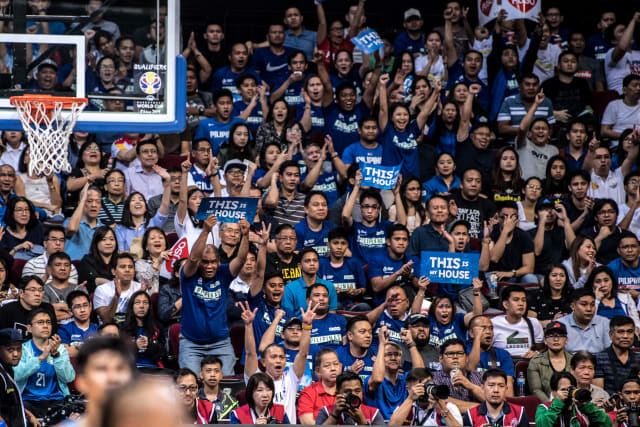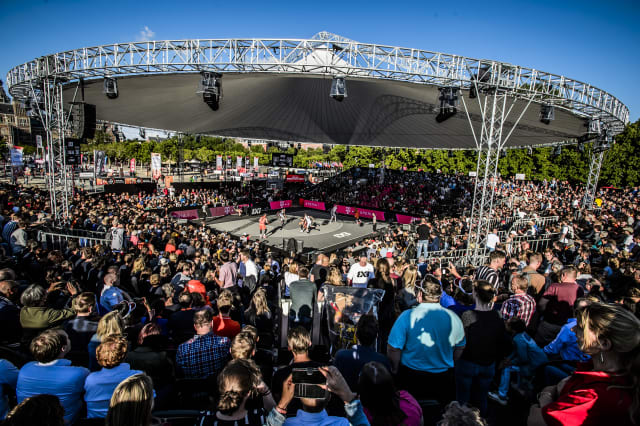Key decisions highlight last FIBA Executive Committee of the 2014-2019 cycle
MIES, Switzerland - FIBA's Executive Committee met on Friday at the Patrick Baumann House of Basketball. It was the last meeting of the 2014-2019 cycle.
MIES (Switzerland) - FIBA's Executive Committee met on Friday at the Patrick Baumann House of Basketball. It was the last meeting of the 2014-2019 cycle.
With only 63 days to go to the first game of the FIBA Basketball World Cup 2019 in Beijing, the Central Board received a detailed update on the final preparation works for FIBA's flagship event, including the promotional, operational and commercial aspects. Set to feature a record 32 national teams, the FIBA Basketball World Cup will be played in eight Chinese cities from August 31 to September 15.
Here are the main decisions taken by the Executive Committee during its meeting.
FIBA Continental Cup Qualifiers 2021
The Executive Committee received an assessment on the FIBA Basketball World Cup Qualifiers based on a research from an independent sports consultancy. It confirmed the success of the first ever Qualifiers on three key aspects like attendance, media coverage and interest from fans around the globe.
The research shows that the 420 games attracted 1.7 million fans to 157 arenas around the world, resulting in 157 sold-out games and an average arena occupancy of 68 percent. The format attracted big crowds on all continents with, for example, 23,500 watching the Philippines play Australia in Manila, 12,167 in Helsinki for the clash between Finland and France, 11,000 for the African game between Angola and Egypt and 10,550 for Brazil versus Chile.

Significantly, live TV coverage in more than 150 markets was supplemented by a social media reach of 2.2 billion, with 591 million impressions and 7.5 million engagements across all platforms, as well as a total of 429 million video views.
It was not only the committed basketball fans who enjoyed the Qualifiers. The study shows that over 63 million fans who do not watch other basketball games made a point of following the Qualifiers, resulting in significant fanbase growth in all areas.
Following requests by National Federations from Americas and Europe, and after consultation with ULEB, the Executive Committee has reviewed the calendar for the Continental Cups 2021 Qualifiers. Taking into consideration:
The number of games needed to qualify for the Continental Cups 2021 (6 games) and the number of windows initially scheduled (four: November 2019, February and November 2020, February 2021); The tremendous impact generated by having two games of the National team during every window of the World Cup Qualifiers, acting as a multiplier and creating a positive effect in the countries where those games are played; The heavy workload and condensed calendar for players during the 2019-20 season due to the early start of the Tokyo 2020 Olympic Games; [/unordered]the Executive Committee decided to optimize the Continental Cups 2021 Qualifiers, by having all teams play two official games during each window of the Qualifiers. As a result, the qualifier game from the November 2019 window will be rescheduled so that the Qualifiers will start in February 2020, continue in November 2020 and February 2021, with two games played by each team in every window. This rescheduling applies only to Continental Cups 2021 Qualifiers and will not impact future FIBA Basketball World Cup and Continental Cup Qualifiers.
This new schedule will further reduce the workload of players, optimize the logistics and costs for National Federations, and allow more space for the national leagues in an exceptionally condensed season before the Olympic Games.
Olympic Qualifying Tournaments
The Executive Committee also discussed the qualification for the Tokyo 2020 Olympic Games.
The FIBA Basketball World Cup 2019 will qualify directly 7 teams to the Tokyo 2020 Olympic Games while the 16 next best classified teams at the World Cup will get the chance of qualifying through the FIBA Olympic Qualifying Tournaments. The Executive Committee has confirmed the sporting criteria for the selection of the two additional teams per region to complete the lineup of a total of 24 teams (4 tournaments of 6 teams each) for the FIBA Olympic Qualifying Tournaments.
The FIBA World Ranking Men, presented by NIKE, published after the FIBA Basketball World Cup will determine those 8 teams: The two best-ranked teams per Region (Africa, Americas, Asia-Oceania and Europe) who are not already qualified directly for Tokyo 2020 or for the Olympic Qualifying Tournaments will be selected to play in the FIBA Olympic Qualifying Tournaments.
3x3
The Executive Committee received an update on the start of the season, highlighting the success of the FIBA 3x3 World Cup 2019 that took place last week in Amsterdam and on the 3x3 Tokyo 2020 Olympics preparations.

Other important matters included:
The Executive Committee confirmed the date of the next FIBA InterContinental Cup for 7-9 February 2020. It received a report on all five Zone Assemblies that took place in the last two months. [/unordered]
###
About FIBA
FIBA (fiba.basketball) - the world governing body for basketball - is an independent association formed by 213 National Basketball Federations throughout the world. It is recognised as the sole competent authority in basketball by the International Olympic Committee (IOC).
For further information about FIBA, visit fiba.basketball or follow FIBA on facebook.com/fiba, twitter.com/fiba, instagram.com/fiba and youtube.com/fiba.